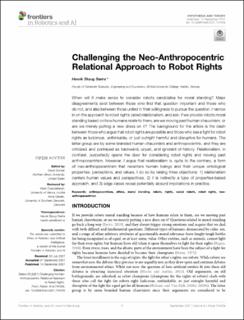Challenging the Neo-Anthropocentric Relational Approach to Robot Rights
Peer reviewed, Journal article
Published version
Permanent lenke
https://hdl.handle.net/11250/2799822Utgivelsesdato
2021Metadata
Vis full innførselSamlinger
Originalversjon
Frontiers in Robotics and AI. 2021, 8, Artikkel 744426. https://doi.org/10.3389/frobt.2021.744426Sammendrag
When will it make sense to consider robots candidates for moral standing? Major disagreements exist between those who find that question important and those who do not, and also between those united in their willingness to pursue the question. I narrow in on the approach to robot rights called relationalism, and ask: if we provide robots moral standing based on how humans relate to them, are we moving past human chauvinism, or are we merely putting a new dress on it? The background for the article is the clash between those who argue that robot rights are possible and those who see a fight for robot rights as ludicrous, unthinkable, or just outright harmful and disruptive for humans. The latter group are by some branded human chauvinists and anthropocentric, and they are criticized and portrayed as backward, unjust, and ignorant of history. Relationalism, in contrast, purportedly opens the door for considering robot rights and moving past anthropocentrism. However, I argue that relationalism is, quite to the contrary, a form of neo-anthropocentrism that recenters human beings and their unique ontological properties, perceptions, and values. I do so by raising three objections: 1) relationalism centers human values and perspectives, 2) it is indirectly a type of properties-based approach, and 3) edge cases reveal potentially absurd implications in practice.

